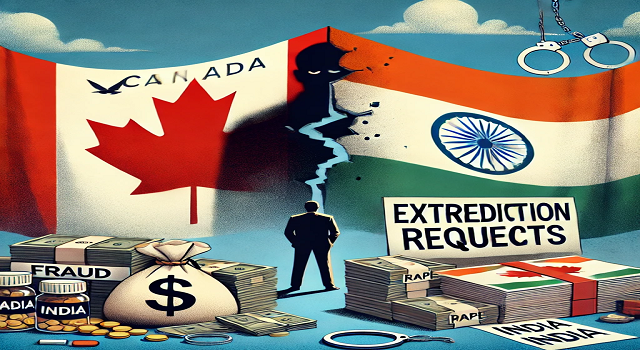Is Canada Becoming A Safe Haven For Criminals Wanted By India
- Posted on 18-10-2024
- News
- By Saumy Verma
- 208 Views
Despite India’s numerous extradition requests for individuals accused of serious crimes, Canada has been slow to act, creating concerns that the country is becoming a refuge for criminals escaping justice in India. The Indian government has repeatedly urged Canadian authorities to take stronger action, but longstanding delays continue to fuel frustration and mistrust between the two nations.

Canada’s inaction on extradition requests from India is raising alarm, with many in the Indian government viewing the country as a “safe haven” for criminals wanted back home. Individuals facing serious charges, including fraud, drug trafficking, domestic violence, and rape, have been living freely in Canada for years, despite India’s efforts to secure their return.
One notable case is that of Gurcharan Singh, wanted since 2003 in connection with a cheating case. Similarly, Omkar Mal Aggarwal, accused of property-related fraud and conspiracy in 2016, continues to evade justice. Even more serious are the charges against Jasvinder Pal Singh Walia, wanted for gang rape and blackmail in cases dating back to 2014-2015. Another request from 2022 regarding Ravinder Singh, accused of cruelty against his wife, also remains unaddressed.
India has provided ample evidence, including phone records and details of suspect locations, but Canadian authorities have been hesitant to act. According to sources, Canada’s reluctance stems from a demand for more substantial proof, even though formal and informal channels of communication have been in place for years.
This perceived leniency isn’t new. Critics point out that Canada, dating back to the 1980s under Prime Minister Pierre Trudeau, has offered asylum to individuals linked to the Khalistan movement, some of whom were involved in the Air India Flight 182 bombing, also known as the Kanishka bombing. India is concerned that similar open-door immigration policies continue to allow criminals and extremists to seek refuge in Canada, contributing to an ongoing cycle of crime.
India has called on Canadian agencies, such as the Royal Canadian Mounted Police (RCMP), to apply the same level of scrutiny to these criminals as they do to individuals linked to terror organizations like ISIS. However, despite the formal establishment of collaborative efforts between India’s National Investigation Agency (NIA) and the RCMP, progress has been slow.
The continued delays in extradition and Canada's reluctance to take action on these cases have only added to the growing frustration in New Delhi. Canadian policies regarding immigration and asylum, combined with official roles given to individuals accused of extremist activities, have deepened the mistrust between the two nations, leaving India’s concerns largely unaddressed.



